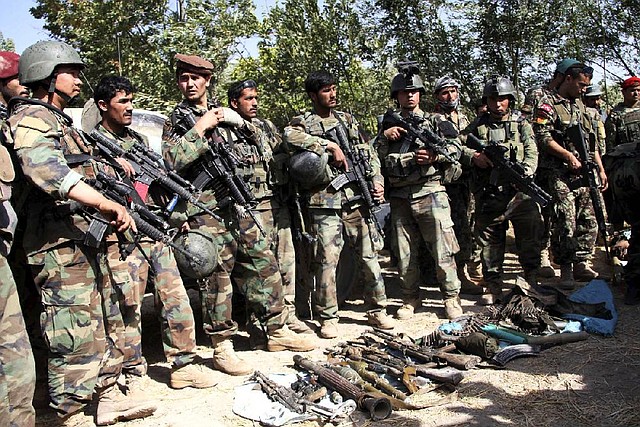Report: Severing of Afghan rebel’s hands spurs Aussie probe
Afghan commandos stand with seized weapons Friday after an operation in Herat province, west of Kabul. Officials said eight suspected Taliban were killed in the overnight raid.
Saturday, August 31, 2013
CANBERRA, Australia - Australian special forces troops are under investigation after being accused of cutting off the hands of at least one dead insurgent in Afghanistan, a national broadcaster reported Friday.
The hands were taken back to the Australian base in Tarin Kowt in Uruzgan province to be fingerprinted after a battle in which four insurgents were killed, Australian Broadcasting Corp. said.
The Australian Defense Force confirmed that it is investigating “an incident of potential misconduct” during a combined operation of the Afghan National Security Forces and Australia’s Special Operations Task Group in Zabul province in April, but didn’t provide details.
The combined Afghan-Australian operation had been targeting an insurgent commander responsible for an insurgent network operating in and around Uruzgan province, the statement said.
“Following the mission, an incident of potential misconduct was raised through the ADF’s internal command chain,” the Australian Defense Force said.
Australian troops are required to take fingerprints and eye scans of very insurgent they kill, if it is possible to do so. Troops are equipped to conduct these investigations in the field. The information is then compared with a growing national biometric data base of insurgent suspects in an effort to identify them.
The Australian Broadcasting Corp. did not report why the hands were not fingerprinted at the scene of the battle.
The report said an investigator from the Australian Defense Force Investigative Service - a branch of the military - told troops during a briefing that it didn’t matter how the fingerprints were taken and that chopping off the hands of the dead and taking them back to base was acceptable.
The mutilation or mistreatment of dead bodies can be a violation of the laws of war.
John Blaxland, a researcher at Australian National University’s Strategic and Defense Studies Center, said that if the allegations were true, the behavior was an aberration of the high standards the Australian military had maintained during more than a decade in Afghanistan. Blaxland said it was possible that a “temporary exception” from procedures had been allowed in the case of “a high-value target.”
Defense analyst Allan Behm said such a “direction would have to be cleared at the very highest levels.”
Neil James, executive director of the Australian Defense Association, an influential security think-tank, said the purported actions might have been justified by the circumstances and that it shouldn’t be equated with the 2011 case of a group of U.S. Marines urinating on the bodies of dead Taliban fighters.
“If it occurred, it would be unusual. It would not necessarily be illegal,” James told Australian Broadcasting Corp.
Australia has 1,550 troops in Afghanistan and is the biggest contributing country outside NATO. Australia has contributed the largest number of elite special forces to the campaign after the United States and Britain.
Prime Minister Kevin Rudd said he had confidence in Defense Force Chief Lt. Gen. David Hurley to investigate the allegations.
Meanwhile, a suicide bomber attacked people leaving a memorial service at a mosque in northern Afghanistan on Friday, killing a district chief, his apparent target, and seven others, police said.
At least 11 people were wounded in the strike, whose victims included several civilians.
No group immediately claimed responsibility for Friday’s attack, but suspicion fell on the Afghan Taliban. The militant group has escalated its actions in recent months to take advantage of the drawdown of U.S.-led foreign troops, who handed over security for the country to Afghan forces two months ago.
The bomber struck in Dashi Archi district of Kunduz province. A police spokesman said the district chief, Sayed Sadruddin, was with tribal leaders and others at a memorial service for someone who had died earlier.
There are currently about 100,000 troops from 48 countries in Afghanistan with the U.S.-led International Security Assistance Force, 60,000 of them American. By the end of this year, the NATO force will be halved, and all foreign combat troops are expected to be gone by the end of next year.
Because of the drawdown, much is riding on the abilities of the fledgling Afghan security forces, which now number about 352,000.
Afghan and coalition officials have warned that the Taliban would intensify the tempo of their attacks after the Muslim Holy month of Ramadan and before the harsh Afghan winter sets in. The Taliban staged multiple attacks this week, leaving dozens dead and even more wounded.
Information for this article was contributed by Rahim Faiez of The Associated Press.
Front Section, Pages 10 on 08/31/2013
